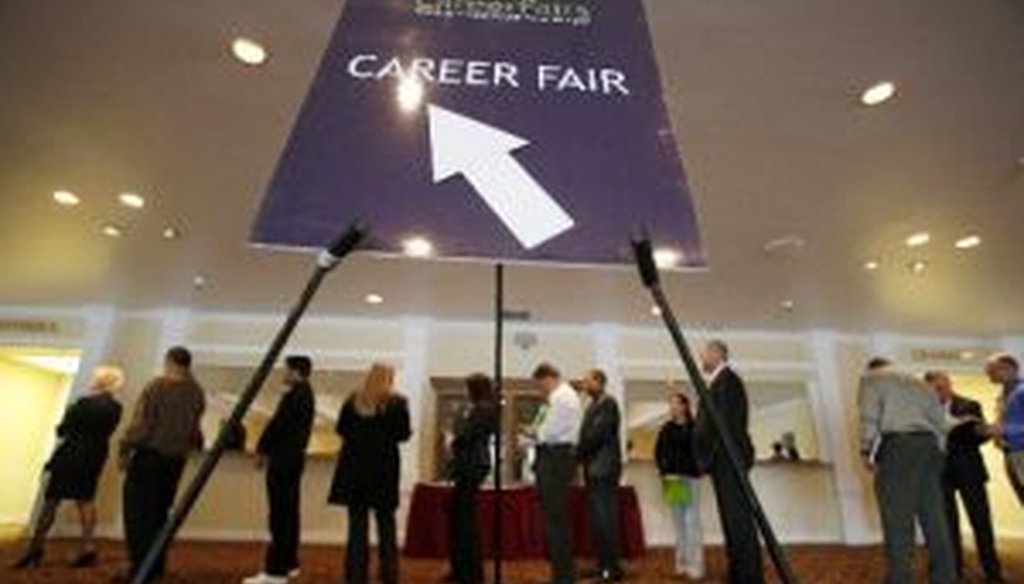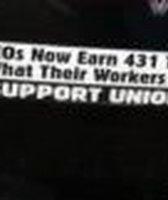Stand up for the facts!
Our only agenda is to publish the truth so you can be an informed participant in democracy.
We need your help.
I would like to contribute

A line forms at a career fair in San Jose, Calif. The federal jobs report released on July 8, 2011, offered only grim numbers to Americans hoping for signs of a sustained recovery.
The release of grim job figures for June -- with unemployment nudging up from 9.1 percent to 9.2 percent and an anemic increase of just 18,000 jobs nationally -- means that neither party will need to reset its talking points. Republicans will continue to portray the nation's joblessness as a disaster, and Democrats will try to counter that things could be worse.
Here's a look at claims about employment that we fact-checked in just the last month:
During an online chat with the Washington Post June 22, 2011, Senate Majority Leader Harry Reid, D.-Nev., responded to a question about high Hispanic unemployment by offering a hopeful statistic. "Hispanic unemployment has been ticking down from an all-time high of 13.9 percent because of the policies we’ve implemented. But we want to accelerate this trend," he said.
Barely True, we said, noting that Hispanic unemployment had been higher than that 13 times, including once during 1975 and 12 times during the recession of 1982-1983 and that the highest it had been since the beginning of the recent recession was 13.2 percent, not 13.9 percent.
As for "ticking down," it had been taking a zig-zagging path, and at the time Reid spoke, it had been ticking up for the previous three months.
Another Democratic talking point is the effort to rebut Republican presidential candidate Mitt Romney's claim that he understands how to create jobs as a result of his experience as governor of Massachusetts. Senior Obama re-election strategist David Axelrod took this tack on an appearance on CNN's State of the Union.
"If you're Governor Romney and you say I'm going to turn this economy around, I've got the answers. You don't offer them. Then people have a right to say, why is it that your state was 47th in the country in job creation when you were governor?" Axelrod said.
We found he was right about the numbers. Indeed, federal jobs numbers indicated that, no matter how we sliced the data, the state was 47th. But economists told us that it's a stretch to blame or credit Romney or any governor for job numbers. So we ruled Axelrod's claim, which suggested Romney was responsible, Half True.
Republicans were at work with claims of their own. "President Obama and liberal former DNC Chairman Tim Kaine’s $787 billion stimulus failed to create jobs," the National Republican Senatorial Campaign said in a June 3 press release. Kaine was Virginia's governor in 2009 and never voted on the bill nor participated in its drafting, but he did emerge as a key spokesman for stimulus as President Barack Obama’s Democratic National Committee chairman. Our colleagues at PolitiFact Virginia looked into the NRSC's claim.
In addition to finding data on jobs created in Virginia by the stimulus, they cited a March report by the president’s Council of Economic Advisers that estimated that between 2.5 million and 3.6 million jobs were created or saved by the stimulus through the fourth quarter of 2010. Separately, the council’s report cited four independent analyses -- by the Congressional Budget Office and three private economic analysis companies -- that credited the stimulus with saving and creating jobs. They rated the NRSC's statement False.
Then there were a couple of historical comparisons. Mitt Romney, campaigning in Florida, called it "the slowest job recovery since Hoover" -- that is, President Herbert Hoover, who held office from 1929 to early 1933 and presided over the early years of the Great Depression. We found that claim False, since we found that, depending on the yardstick used, it was either the third worst or the fifth worst job recovery since World War II.
Also False was a claim by Republican National Committee chairman Reince Priebus. "We have unemployment that rivals the Great Depression," he told NBC's Meet the Press. We looked at data and talked to economists. Although the recent recession was certainly the worst since the Great Depression, we didn't find support for the notion that the unemployment it created "rivals" the Great Depression in severity.
Of course, there are plenty of downbeat job statistics to check. We also looked at New York Times columnist Paul Krugman’s comment that "the average unemployed American has been out of work for almost 40 weeks."
The federal Bureau of Labor Statistics publishes statistics for "average weeks unemployed" for unemployed workers. For the most recent month available at the time Krugman made his claim, May 2011, the figure was 39.7 weeks, so we called it True.
And it’s now truer than ever: The July 8 report showed that the number had risen by two-tenths of a percentage point to 39.9 weeks.
Our Sources
See original Truth-O-Meter items.
















































